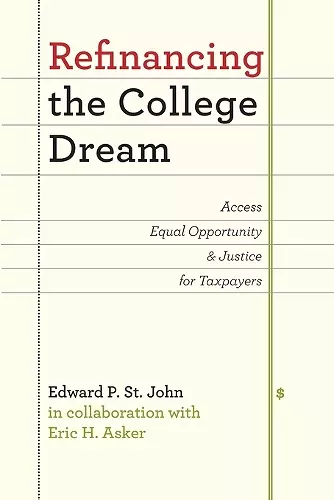Refinancing the College Dream
Access, Equal Opportunity, and Justice for Taxpayers
Edward P St John author Eric H Asker author
Format:Paperback
Publisher:Johns Hopkins University Press
Published:5th Sep '14
Currently unavailable, and unfortunately no date known when it will be back

Makes an important contribution to the struggle for fairness and justice in providing access to higher education. It is a very sophisticated and thoughtful piece of public policy work. -- Richard Fossey, University of Houston This book stands out from others like it by uniquely adopting and utilizing a useful conceptual framework-Rawls' theory of justice-to understand student financial aid policy. With its attention to equity, opportunity, and efficiency, this framework will be especially compelling to those interested in using research to influence public policy. -- Laura W. Perna, University of Maryland at College Park
Refinancing the College Dream offers a theoretical and practical foundation for boldly rethinking the financial strategies used by colleges and universities, states, and the federal government to accomplish this essential goal.During the 1990s, rising tuition costs and inadequate federal grant aid prevented more than a million otherwise qualified, low-income students from continuing their education past high school. Education policy expert Edward P. St. John is troubled by this situation and argues that equal access to higher education is both feasible and just. In Refinancing the College Dream, he examines recent trends in public funding of education and explores alternatives to financing which would provide equal access to postsecondary education for all Americans. The growing gap in the rate of participation in higher education for low-income groups compared to upper-income groups over the past three decades, St. John finds, has been a direct result of the decreased availability of federal grants, even after taking into account such factors as an increased emphasis on strengthening high school graduation requirements. To reverse this trend, he suggests that policymakers refocus the debate over the public financing of higher education from taxpayer costs to principles of social responsibility and justice, along with economic theories of human capital. He then shows how improved coordination between state and federal agencies, expanded use of loans, and better targeting of grant aid can maximize access for low-income students while minimizing increases in taxes. Making higher education accessible to low-income students is one of the crucial challenges for citizens and policymakers in the early twenty-first century. Refinancing the College Dream offers a theoretical and practical foundation for boldly rethinking the financial strategies used by colleges and universities, states, and the federal government to accomplish this essential goal.
A thorough critique of the past four decades of higher education assistance programs... A brave attempt to reconcile the progressive zeal for access and the conservative pressure for academic accountability. -- Joseph M. Cronin Connection Compelling arguments about how changes in the federal student aid programs since the 1970s have restricted access to higher education because of the tilt towards assisting the middle class. -- David R. Smedley Pennsylvania Association of Student Financial Administrators Newsletter Essential reading for anyone who wants to understand the barriers that keep academically qualified students out of college. Indeed, it will become one of the most widely read and discussed books dealing with college finance. St. John establishes that finances present substantial barriers that keep low-income students out of college, and he fundamentally changes the debate over how those barriers should be overcome. -- Michael Mumper Academe Occasionally, a work appears that is nothing less than mandatory reading for those who claim any interest in American higher education. Edward St. John's is one such work. -- R.P. Pedersen Community College Week St. John makes a compelling case that the current system of student financial aid is not designed to adequately serve the needs of low-income students, thanks in no small measure to recent educational reforms. His framework for taking academic preparation into account when discussing access makes excellent sense. The overall scope and passionate arguments of the book, though wide-ranging and somewhat complicated, are welcome additions to the policy arena that tends toward the dry and over-simplified. -- Greg Dubrow Review of Higher Education With his extensive experience and expertise, Edward St. John offers a significant contribution in our understanding of the role of financial aid policy in accessing higher education over the past decades. Beyond the economics of education, the author discusses financial aid within the context of social responsibility and justice. -- Dongbin Kim and Jenny J. Lee Journal of College Student Development
ISBN: 9781421415789
Dimensions: 229mm x 152mm x 18mm
Weight: 522g
272 pages